#israel lobby
Text
who'd have guessed 🙄
I can’t believe liberals were worried about fake “Russian election interference” but Israel determining US domestic policy is totally cool and fine with them 🤔" from revolutionaryth0t, 13/Mar/2024:


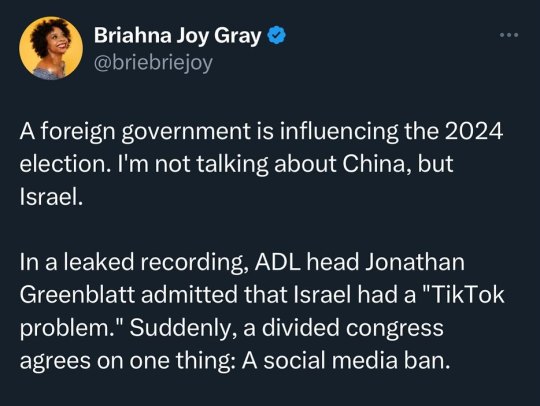
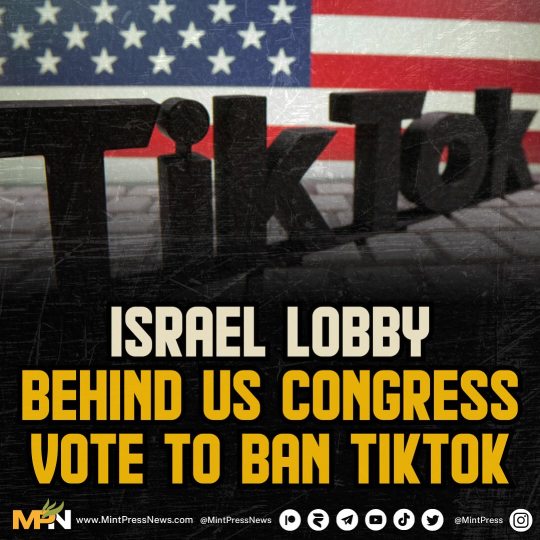
#tiktok#tiktok ban#us politics#us elections#palestine#free palestine#gaza#free gaza#keep talking about palestine#dont stop talking about palestine#from the river to the sea palestine will be free#i stand with palestine#rafah#save rafah#israel lobby
739 notes
·
View notes
Text
Just imagine 😆

#aipac#Israel lobby#Israel#corruption#greed#insanity#money in politics#Jumblr#jewblr#am yisrael chai#Joe Biden#democrats#republicans#Donald trump#Thomas massie#free Palestine#free the US from Israel#palestine#the sopranos#memes#Italian#Italian mafia#organized crime
20 notes
·
View notes
Text
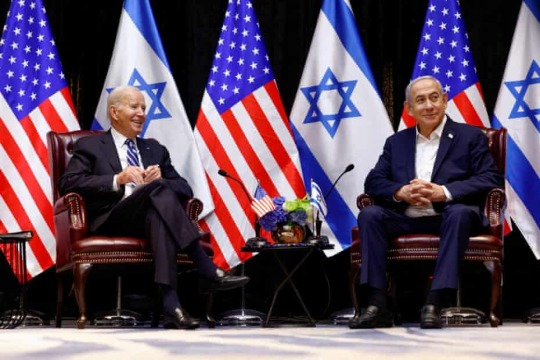
[ 📸 U.S. President Joe Biden, from Delaware, remains the largest recipient of Israel Lobby cash in the U.S. political system at over $4'300'000 received over his long congressional career.]
🇺🇸🇮🇱 🚨
TOP TEN LARGEST U.S. POLICYMAKER RECIPIENTS OF ISRAEL LOBBY CASH
Mint Press News has compiled a list of the top ten U.S. Politicians who receive the most money from the Israel Lobby.
Here are the largest recipients of Israel Lobby cash in the U.S. political system:
1. U.S. President Joe Biden (D-Del.), $4'346'264.
2. Robert Menéndez (D-NJ), $2'483'205.
3. Mitch McConnell (R-KY), $1'953'160.
4. Chuck Schumer (D-NY), $1'725'324.
5. Steny Hoyer (D-MD), $1'620'294.
6. Ted Cruz (R-TX), $1'299'194.
7. Ron Wyden (D-OR), $1'279'376.
8. Dick Durbin (D-IL), $1'126'020.
9. Josh Gottheimer (D-NJ), $1'109'370.
10. Shontel Brown (D-OH), $1'028'686
#source
@WorkerSolidarityNews
#us news#israel lobby#israel#united states#us politics#us foreign policy#money in politics#politics#news#geopolitics#world news#global news#international news#breaking news#current events#gaza war#gaza#palestine#corruption#us corruption#us president#joe biden#us politicians#imperialism#foreign policy#american foreign policy#american corruption#american politics#american news
28 notes
·
View notes
Text
Heads Up About the ADL
The Anti-Defamation League is a hundred million dollar Zionist lobby group for the state of Israel. They ran a propaganda campaign against Nelson Mandela and have repeatedly accused Norman Finkelstein of being a “Holocaust denier” for his support of Palestine. They also sent letters to almost 200 university presidents condemning Students for Justice in Palestine, alleging they should be investigated for “funding/receiving funds from Hamas.” They facilitate training seminars for ICE and US police in Israel and have worked with multiple officers charged with using undue force against civilians, including former St. Louis police chief Tim Fitch. Anyway I keep seeing that ADL tweet get quoted and I’m not gonna quote it and give them traffic but just fyi all their articles and takes are 100% evil bullshit propaganda.
#zionistterror#free palestine#free gaza#antizionism#anti zionisim#zionazis#zionistcensorship#israhell#israel lobby#class warfare#warning yall about the ADL#politics#the more you know
18 notes
·
View notes
Text
A clip of Gideon Levy giving a speech at the National Press Club on April 10, 2015, titled: "Does unconditional support for Israel endanger Israeli voices?"
Full speech ➡️ https://youtu.be/DGO3eBxQX7Q
Conference website (still up!) ➡️ https://www.israellobbyus.org/
6 notes
·
View notes
Link
Irrational fanaticism
#Christian Zionism#religion#heresy#politics#warmongering#apocalypse#extremism#Israel lobby#John Hagee#Evangelicals#megachurches#Americans#Palestine#Syria#Armenia
2 notes
·
View notes
Text
youtube
Why does the US keep supporting Israel, even tho, Israel is CLEARLY committing a genocide? I'll also link a NYT article that validates this YouTuber's claim that AIPAC is actually a powerful Zionist organization in America that funds both Republicans and Democrats.
https://www.nytimes.com/2024/02/16/us/politics/gaza-peace-lobby-washington.html
AIPAC targets progressive candidates that tries to speak out against them or Israel.
https://abcnews.go.com/Politics/progressive-groups-launch-reject-aipac-effort-democratic-divides/story?id=107983585
2 notes
·
View notes
Text
DUMP AIPAC. It's not democracy with this lobby.
It's had its time.
#democracy#us elections#israel lobby#israeli apartheid#israeli occupation#illegal occupation#right wing extremism#palestine#palestinians#free palestine#free gaza#genocide#war crimes#justice#usa#the squad#buying elections#rigged election#dump aipac#aipac#dark money#settler colonialism#settler violence#fraud#election fraud#american left#jewish voice for peace#protests
2 notes
·
View notes
Text
Anti-Zionism is not antisemitism
(RNS) — The Muslim and Jewish communities in the West have a decades long history of standing together in solidarity against Islamophobia and antisemitism and supporting one another in times of pain. We have faced a similar bigotry and an uptick of hate-fueled attacks on our communities in recent years. We have been familiar faces to one another at the endless press conferences in the aftermath of so many of those incidents.
But these relationships cannot be confined to empathy at home. When that same hatred is overseas, it has to be just as near to our hearts. And at a time in which Palestinian civilians — two-thirds of whom are women and children — are being killed at a rate of 280 per day, we must affirm that anti-Palestinian racism and bigotry are also extensions of Islamophobia. We must also be crystal clear as to what anti-Zionism is and is not.
Anti-Zionism is not antisemitism.
It is a travesty that we are forced to state and defend what should be an undeniable fact. It is a strategic conflation made by the Zionist lobby, engineered to suppress a shift in narrative and public opinion that increasingly humanizes Palestinians and rejects the Israeli occupation. Over the past two months, Israel’s indiscriminate bombardment and ground invasion has resulted in more than 16,000 Palestinians killed and at least 40,000 more injured. And with that, a global audience otherwise ignorant of the Palestinian catastrophe has been granted firsthand access to the crimes of the Israeli occupation.
House Resolution 894, a resolution that strongly condemns and denounces the “drastic rise of antisemitism in the United States and around the world,” also states “that anti-Zionism is antisemitism.” This is an ignorant at best — malicious at worst — attempt to amalgamate two disparate concepts. Antisemitism is a discriminatory and bigoted view of the Jewish people, a people with a millennialong history, while anti-Zionism opposes a political ideology introduced in the late 19th century that sought the establishment of an ethnostate on Palestinian territory.
On December 5, the resolution passed despite last-ditch efforts by three Jewish Democrats, who urged their colleagues to avoid what they termed an “attempt by Republicans to weaponize Jewish pain.” They described the resolution as “just the latest unserious attempt by Republicans to weaponize Jewish pain and the serious problem of antisemitism to score cheap political points.” While 92 Democrats voted merely “present,” a majority voted in favor, marking a dramatic disconnect between Democrats in Congress and their constituents — at a time when Gallup data shows “Democrats’ sympathies in the Middle East now lie more with the Palestinians than the Israelis.”
And the impact of AIPAC lobbying cannot be overstated. As M.J. Rosenberg wrote for the Huffington Post in 2017, “(Democrats) are in the grip of a foreign policy lobby as powerful as the NRA, the American Israel Public Affairs Committee, or AIPAC.” Rosenberg alluded to Democrats’ decadeslong frustration with the National Rifle Association’s lobbying efforts against gun control measures. “Sorry, Democrats: your NRA is spelled AIPAC,” he titled the piece.
House Republicans, and the GOP at large, began this deliberate mischaracterization of anti-Zionism years ago. In his remarks at the 2019 AIPAC Policy Conference, then-U.S. Secretary of State Mike Pompeo catered to the crowd. “Let me go on the record,” he said. “Anti-Zionism is antisemitism.” He defined anti-Zionism as denying “the very legitimacy of the Israeli state and of the Jewish people.”
And that is exactly the conflation AIPAC hopes to embed and establish in the public discourse, the idea that the Israeli occupation and the Jewish people are inseparable. But as Dave Zirin of The Nation puts it, this is the greatest disservice to the Jewish people. “Anyone who attempts to fasten a 5,000-year-old religion to a 150-year-old colonial project is guilty of antisemitism. They are pushing the idea that my family, merely because of our religion, supports war crimes abroad and the crackdown on critics at home.” It also assumes American Jews are a homogenous group; a Pew Research Center survey found that most American Jewish adults take the position that God “did not literally give” the land of Israel to the Jewish people.
Anti-Zionists, including thousands of Jews across the globe, reject the notion of an ethno-state that expels the existing Palestinian population. Anti-Zionists oppose the Israeli occupation on the basis of the myriad human rights abuses that Israel has carried out since its founding. These include the displacement and ethnic cleansing of millions of Palestinians, the establishment of an apartheid system that systematically disenfranchises Palestinians, a sustained illegal occupation, the murder of tens of thousands of Palestinians over the past seven decades and the ongoing genocide in Gaza.
Anti-Zionism is not antisemitism. It would be absurd to be forced to make the same clarifications regarding other distinctly independent concepts, and it is an indictment of the uninformed level of discourse Congress has succumbed to. Equating anti-Zionism and antisemitism is a strategic and calculated measure designed to stifle criticism of the Israeli occupation and instill fear in those who speak out, Jews and non-Jews alike.
After the resolution’s passage, I wrote on X (formerly Twitter) that, “according to the House of Representatives, the Muslim community that has stood in solidarity in front of synagogues and Jewish community centers against hate for years — yet also opposes Zionism — is to be considered antisemitic. And all of the brave members of the Jewish community standing in solidarity against occupation are also apparently antisemites. Make it make sense.”
Unfortunately, it will never make sense. To equate anti-Zionism and antisemitism is to conflate being Jewish with being Zionist, and, as Dave Zirin posited, “this is rank antisemitism: the assumption that to be Jewish is to support Israel’s crimes.” Ironically, despite the resolution’s stated attempts to condemn antisemitism, it — in fact — fans the flames of bigotry. This resolution seeks to weaponize Jewish pain by criminalizing criticism of the occupation, apartheid and systemic racism, all of which are part and parcel of the current Israeli fabric.
#anti zionism isnt anti semitism#stop weaponizing words to prevent debate#complicit in genocide#genocide#israel lobby#aipac#israel is an apartheid state#apartheid#ethnic cleansing#collective punishment#save palestine#free palestine 🇵🇸
2 notes
·
View notes
Text
I'm shocked. This is shocking news /s
from Ian, 15/Mar/2024:
#tiktok#tiktok ban#israel lobby#fuck america#fuck israel#palestine#free palestine#keep talking about palestine#dont stop talking about palestine#fuck zionism#fuck zionists
5 notes
·
View notes
Note
in regards to your ‘i hate nazis means that i’m not antisemitic at all’ post.
tagging your posts with “am yisrael chai” and “jumblr” on a post that has NOTHING TO DO WITH BEING JEWISH is a terrible thing to do and contributes to your antisemitism. you equate all jews with the actions of israel’s government. you are saying all jews are bad because of that. that is not okay nor correct. this is what people mean when they are calling you antisemitic, not because you’re a nazi who calls for the extermination of jews but because you circulate lies that make it easier for those nazi’s to exterminate us.
please stop using “am yisrael chai” and what not on these posts that have nothing to do with being jewish. :/
If Israel has NoThINg tO dO wItH bEiNg jEwIsH then why is the Israel lobby passing resolutions and laws that say anti-Zionism is antisemitism?






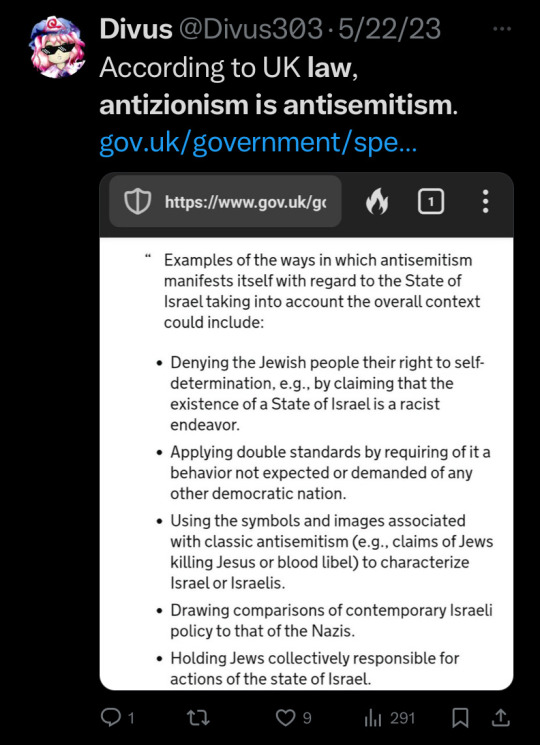
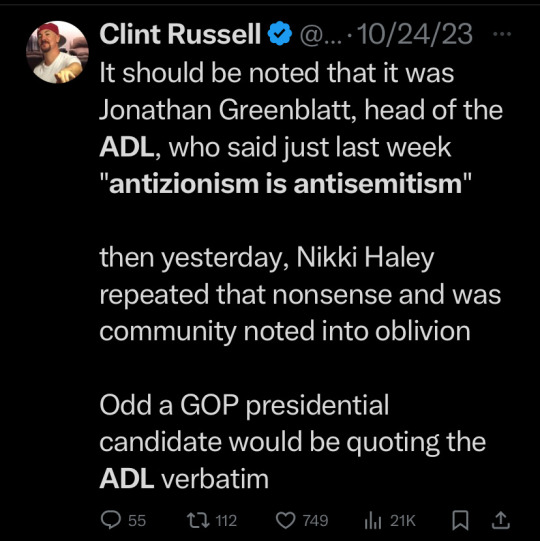
#Antizionism#antisemitism#Ben Shapiro#Candace Owen’s#aipac#Israel lobby#Jumblr#jewblr#am yisrael chai
19 notes
·
View notes
Link
Also interesting is what doesn't get reported.
The Foreign Agents Registration Act (FARA) requires any country that spends money to influence Americans politically (or even to encourage tourism) to report how much it is spending.
In 2018, the State of Israel was the top spender of any government, spending $35 million directly in the US according to FARA filings with another $15 million from the World Zionist Organization and the Jewish Agency for Israel.
That number has plummeted to practically nothing - $16 million in 2019, $2 million in 2020, $600,000 in 2021 and a mere $263,000 so far this year from the government of Israel.
The literal Israel lobby spending has gone practically to zero. But the media won't report that, because it doesn't fit the narrative of Israel controlling the US.
Now, how much do you hear about how much these countries spend to influence US policies last year?

The obsession we are seeing with the Israel lobby cannot be explained by its actual influence. It can only be explained by wanting to convince people that powerful Jews are controlling American politics.
There's a name for that.
27 notes
·
View notes
Link
Several things inspired me to write the book. One was my sense that people in the US and around the world project antisemitic tropes and legends onto their discussion of US-Israel policy. I’ve traveled all over giving lectures and meeting with people for the State Department as a speaker, and it was almost a universal conviction, not just in the Middle East, but I found it in Europe and Latin America, Malaysia, that the Jews run America, which is why America has a pro-Israel policy.
Now there’s a debate, is it that the Jews in Israel tell the American Jews what to do? And then they pass the instructions on to the American government? Or is it that the Jews in America are actually using Israel as part of their even grander Jewish plot? That kind of hate is morally reprehensible, but also, that kind of ignorance is dangerous.
Part of the book is just trying to clear some things I want to dispel some rancid urban legends about Jews and Jewish influence.
What’s a little-known fact or misunderstanding that you think Israelis need to better know about the relationship with the US?
I spent a lot of time in the book, looking at the politics in the US, under [president] Harry Truman, between 1945 and 1948, leading up to the War of Independence. And it seems very clear to me that the idea was very common in America… that somehow Harry Truman saved the Jews. There’s the story that in the spring of 1948, it all looks very dark and Harry Truman is refusing to see any Zionists, any American Jews. But then little Eddie Jacobson, Harry Truman’s old Jewish friend and business partner from Missouri comes in and says – kind of like Queen Esther – says to the moody gentile ruler, you’ve got to do something for my people. And so, Truman meets with [Chaim] Weizmann and then everything is settled, Israel was saved, and even the littlest Jew in the littlest town in America can play a role. That’s this beautiful legend that people have. It’s factual in the sense that Jacobson did intervene, and Truman did have a meeting with Weizmann.
But in fact, American policy did not change as a result of that meeting, and right up through [the Israeli] Declaration of Independence, the US opposed the declaration of a Jewish state and wanted a new trusteeship to replace the British. The last thing the Israeli cabinet did before voting for independence was to vote to reject the American proposal for longer mediation. Israel actually begins its independent career by saying no to the US.
15 notes
·
View notes
Text
Assessing AIPAC's Victories
Last night, Rep. Haley Stevens soundly defeated fellow incumbent Rep. Andy Levin in a D-on-D Michigan primary matchup. The race drew significant attention in the Jewish community because of the gobs of money AIPAC spent seeking to oust Levin and support Stevens. Levin earned AIPAC's ire because he is a vigorous proponent of America taking more robust steps to protect a two-state solution for Israel and Palestine -- including steps which entail places checks on Israeli government policies which place that solution in jeopardy. While I endorsed Levin, I want to be clear that I harbor no ill-will towards Haley Stevens, whom I also like and have zero qualms supporting in the 2022 general.
In any event, as the primary season nears its conclusion, it is fair to say that AIPAC's initial foray into direct candidate advocacy has been relatively successful. So far, it has notched ten victories against two defeats in the Democratic primaries it has substantially invested in. To be fair, that figure is a bit misleading, as in many of the races AIPAC either was backing a candidate who already came in as a favorite, or were in relatively low-salience open-seat races where AIPAC's firehose of cash swamped the field. For example, Stevens entered the race against Levin as the substantial favorite -- more of her old turf than Levin's was placed in the new district they both ran in, and she is generally regarded as a better and more natural campaigner than Levin. Indeed, my hot take was that Stevens probably would've bested Levin even without AIPAC's giant cash infusion. But certainly, AIPAC probably is relatively happy with its performance thus far.
What AIPAC bought with its investment into the Stevens campaign was the ability to write a narrative. It's hoping the political message taken from Stevens' victory includes lessons like "pro-Israel is good politics" or "supporting conditioning aid on Israel is a sucker's bet in Democratic politics." Needless to say, AIPAC's critics are hard at work resisting these narratives and trying to spin out others of their own ("AIPAC is a vector for letting GOP billionaires take over Democratic politics"). Meanwhile, as in nearly all races of this sort, the national attention on the race (centered on Israel/Palestine) almost certainly had relatively little impact on the local considerations that drive votes one way or another. At the end of the day, Stevens won her old turf, Levin won his old turf, but the new portions of the districts, formerly represented by Rep. Brenda Lawrence, went to Stevens -- who had Lawrence's endorsement. The actual lessons may not be much more complicated than that.
I want to do my best to separate wheat from chaff here. There are lessons to be drawn from AIPAC's victories this primary season. Though not every ecstatic claim of AIPAC supporters can be borne out, they have proven some lessons true.
At the most basic level, AIPAC's argument is that its primary victories show that Democratic voters support its version of "pro-Israel" politics. Yet this, I will suggest, remains unproven. As much as it has spent on these races, AIPAC has been notorious for virtually never speaking about Israel or Israel-policy in its advertisements or promotions of its preferred candidates. This suggests that it doesn't think that issue is necessarily a winner for them.
However, it does seem true that running against AIPAC's policies is not a winning strategy in most Democratic primaries. This is, perhaps, another "Twitter is not real-life" lesson -- the excitement and enthusiasm one sees online for a candidate who "stands up to the Israel Lobby" is not reflected in on-the-ground political performance. While it's unclear that voters affirmatively value AIPAC-style "pro-Israel" politics, it's quite evident that they don't find even Levin-style two-stateism to be a major political motivator. Similarly, it seems pretty clear that -- as of right now at least -- AIPAC has not faced any substantial backlash from Democratic voters for backing insurrectionist Republicans. A Democratic candidate who is viewed as "the pro-life candidate" is toxic in a 2022 Democratic primary. A Democratic candidate who is viewed as "the AIPAC candidate" isn't. This might change over time -- I suspect there is quite a bit of festering ill-will towards AIPAC amongst many Democratic Party actors that is waiting for an opportunity to burst forth -- but right now, AIPAC's position is secure.
It's also worth noting, in the context of right-wing Jews crowing about Levin's defeat to Stevens, that AIPAC's success does seem to decisively falsify the alarmist and opportunist narrative that the Democratic Party is being "taken over" by anti-Israel forces, that such positions are the new normal or mainstream in Democratic political life, and so on. To be clear, I find it repulsive to argue that Andy Levin in any way represents an "anti-Israel" position. But the point is one cannot simultaneously promote all of AIPAC's successes in Democratic primaries while also saying that the true soul of the Democratic Party is irreducibly hostile to Israel.
I also do think it's fair to say that AIPAC has reestablished some of its perhaps decayed deterrent effect. Democrats know that if they get on AIPAC's bad side, it can and will dump vast sums of money into ousting them from office. And by the same token, if they play ball with AIPAC they can access those same sums for themselves. That's a powerful inducement.
That said, the question of how AIPAC's interventions will affect political decision-making by prospective Democratic politicians on Israel is more complicated than might appear at first blush. I do think that, on average, a lesson that will be learned by many mainstream Democrats is "don't get on AIPAC's bad side", and to that end will result in more Democrats taking up AIPAC-friendly positions. Those positions include nominal support for a two-state solution -- AIPAC does that too -- so long as that support doesn't take the form of ever asking for any pressure on Israel or demands that America use its leverage to pushback against Israeli decisions that are destructive to the possibility of eventually establishing a Palestinian state. However, I also think that AIPAC has also paradoxically opened space for at least some Democrats to be more radical on the issue -- for example, in endorsing one-statism* -- because they'll internalize the lesson that more "moderate" approaches like Levin's robust two-stateism don't offer any political advantage.
Let's simplify potential Democratic Israel positions into three categories: (1) AIPAC-style status quo (represented by someone like Stevens), (2) The Andy Levin or J Street style two-stateism , or (3) Rashida Tlaib style one-stateism. Of course, some politicians have very strong feelings on this question and will choose based on those deeply-felt sentiments. However, my core model assumes that most politicians don't have hard-and-fast policy preferences on most issues. Rather, on most issues beyond the rarefied few they care deeply about, they will choose the political path-of-least-resistance amongst the set of choices which meet their basic criteria of moral tolerability, even if a different choice might be closer to their ideal ideological preference. So if we imagine a politician who really doesn't care one way or another about Israel/Palestine -- they are at least not repelled by any of the three forms of Israel positions above -- they won't adopt the position they "believe in" the most, they'll pick the position that is politically easiest and least likely to generate controversy or backlash. AIPAC's victories have strongly suggested that, in many contexts, that would be position #1 -- even in Democratic primaries. And to that extent, AIPAC probably will succeed in moving the Democratic needle towards its preferences.
However, we can also imagine a different sort of potential progressive candidate, one who does not find AIPAC-style status quo advocacy to be morally tolerable. For this candidate, the two viable choices for their Israel/Palestine positions are categories #2 and #3. Historically, many would have picked door #2, again, because it's the path of political least resistance. Indeed, if such a candidate a few years ago had asked me for advice -- had said that they had serious concerns about Israel's behavior and they simply couldn't endorse a position of total and unconditional support -- I'd have told them that, so long as they supported two states and opposed BDS, they'd probably be okay. They wouldn't necessarily be endeared to AIPAC or other like actors, but they wouldn't be seen as beyond the pale either. But endorse BDS, or oppose Israel's existence outright, and the full sound and fury would fall onto them.
But now AIPAC may have changed the calculus. By going scorched earth on Levin, it sends the message that it views categories #2 and #3 as equally destructive. Suddenly, door #2 is not a political "path of least resistance" compared to door #3. And if they're both going to bring AIPAC's full fury down upon the candidate, well, at that point you might as well choose based on your ideological preference. Some of these candidates, will sincerely prefer robust two-stateism over one-stateism (that characterizes me, for instance), so their behavior shouldn't change. But some will no doubt prefer one-stateism, and lacking any political rationale for tacking towards the center, they won't do it anymore.
I worry that this might be the lesson people draw from the Donna Edwards/Glenn Ivey race -- another where AIPAC dumped massive sums of money into the contest. Again, all politics is local and Ivey's victory likely reflects factors that overwhelmingly have nothing to do with AIPAC or Israel. But if one looks at Edwards' trajectory entering this race, and in particular how she tried to heal old suspicions held by Maryland's Jewish voters, it seems hard to argue that she is now (if she ever was) some sort of anti-Israel firebreather. She was never going to be AIPAC's poster girl, but she made a concerted effort to pinch towards the center and assuage Jewish concerns about her record. The result was less than nothing -- AIPAC spends eight figures on sinking her career. To be clear: I have no reason to think that Edwards' moves were anything other than sincere, or that she secretly harbors one-state sympathies. Nonetheless, there absolutely will be other politicians in Edwards' position who may decide "why bother?" There's no sense going through all this effort to listen and grow and build bridges and try and find common ground if they're going to go scorched earth regardless.
In short: there is likely a set of candidates who (a) find both one-stateism and robust two-stateism tolerable, (b) marginally prefer one-stateism over robust two-stateism, (c) would nonetheless back robust two-stateism if that was the path of political least resistance. If robust two-stateism no longer offers any political advantage, they're likely to begin promoting one-stateism. To be clear, these candidates are still likely to lose. AIPAC's hammer puts them at a decided disadvantage. But their logic will be "I'm likely to lose either way, so I might as well swing for the fences." Indeed, there's not just a moral but an instrumental logic here. Consider two strategies: One will have you lose by 10 points in 10/10 races. The second will have you lose by 30 points in 9/10 races, and win by 2 points in the tenth. The rational political actor should choose the second strategy, even if it is objectively less popular (a point I've made regarding the future of BDS in Democratic Party politics)!
Paradoxically, AIPAC may encourage some number of Democratic candidates in the more liberal tranche of the party to start supporting a one-state solution who otherwise would not have done so. And the odds are some of them will end up prevailing in their races (if only because of idiosyncratic local factors). There's a real chance that an upshot of AIPAC's intervention will be to strengthen the political power of the one-state caucus -- not because of some political backlash, but based on how it has altered the political calculus amongst more progressive-minded actors. In many ways, it is J Street that is more of a loser than AIPAC is a winner, and I expect J Street's influence to bleed out not just towards AIPAC, but also towards more radical and uncompromising anti-Israel actors and the far-left. For someone with my politics, that is perhaps the most depressing lesson of all.
So to sum up, here are the lessons I think can be validly drawn from AIPAC's performance this election cycle:
(1) While it isn't demonstrated that Democratic voters support AIPAC's brand of "pro-Israel" policies, it does seem clear that they aren't especially moved or motivated by major alternatives. The political energy behind any alternative to what AIPAC pushes -- whether it's Levin's robust two-state Zionism or explicit non- or anti-Zionist positions -- is vastly exaggerated and isn't translating to on-the-ground political power.
(2) AIPAC, and its affiliates, are not toxic brands in Democratic primaries.
(3) The Democratic Party, including its base, are not "anti-Israel" or sympathetic to "anti-Israel" positions in any meaningful respect.
(4) AIPAC has restored some "deterrent effect" against Democrats who might consider crossing them, at least in circumstances where the Democrat has other political vulnerabilities that can be leveraged (such as after redistricting). Likewise, AIPAC has credibly indicated it can and will substantially invest to support Democrats whom it feels favorable towards.
(5) The average Democratic politician who is not substantially invested in Israel/Palestine as an issue will likely move their position marginally closer to AIPAC's as "political path of least resistance".
(6) Left-wing Democrats who are sympathetic to one-stateism or other more radical anti-Israel positions, but who had been hewing to more J Street style stances because they thought they'd be more politically palatable, may reassess the utility of relative moderation and become more open in their anti-Israel declarations.
* Not the apartheid one-statism where Israel controls the entire territory and Palestinians are perpetual second-class citizens -- AIPAC is clearly fine with that.
via The Debate Link https://ift.tt/Mk75uUx
4 notes
·
View notes
Link
Man of integrity
#Hollywood#John Cusack#Palestine solidarity#Gaza#genocide#ethnic cleansing#apartheid#Israel lobby#politics#propaganda
2 notes
·
View notes
